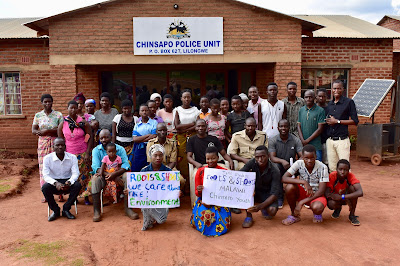STRANGELY, WE DON'T THINK SO AT ALL
There
was dust everywhere as the noise of blaring honks from impatient minibus drivers
rushing to meet their targets for the day grew louder and louder. This writer
sat and watched, in utter amazement and reluctant admiration as the driver of the
minibus made near impossible maneuvers in an effort to wiggle his way out of
the myriad of buses tightly packed together each waiting their turn to fill up
on passengers. When suddenly there was a stirring within the bus and the sound
of a young boy’s voice crying “ayi!
Tasiyani!” he was protesting the intrusion of a man’s hand who was jokingly
trying to grab a little hamster from his hand. Everyone broke into inarticulate
sounds of affection, the uuuuuhs, awwwws and ahhhhs, everyone was warmed by the
boy’s determination to defend his little hamster. He too broke into laughter,
holding his little hamster more closely, as he settled in once again on his
mother’s lap. He was a little too old to still be sitting on his mother’s lap
really, but it was probably to keep from paying for two and cut on costs.
It is sometimes said that Africans do not care
for animals, a view that was also expressed by one of Africa’s most powerful
individuals, South African president; Jacob Zuma. It is reported that he said
owning a pet dog is not African. That was obviously not the case with this
little boy with a hamster on the bus, him and his mother could barely afford a
bus ride within the city, but he obviously cared about his hamster. So we engaged
Dr. Richard Ssuna for a professional take on the matter, especially considering
that he is an African vet, working in Africa and interacting with African
animal owners.
“It
is my opinion that all human beings have an inherent love for animals but the circumstances
in which they grow up determine how much of that love they portray to animals”
Dr. Ssuna said.
For
many, love toward animals is marked by care, and adequate care often requires
money. Dr. Ssuna said “As a race, we have been so encumbered due to poverty,
disease and deficiencies which may not allow us to show love for animals”, this
therefore rules out this most widely used indicator as a measure by which we
can determine how much Africans love their animals, “when one’s basic needs are
met even the needs of the society and
people have disposable income, then there is a perceived love for animals as it
is enhanced by wealth” He further said that in his experience, vaccination
campaigns are held when children are on their School break because they are the
ones who bring their animals for vaccination, he pointed out that this is
because the child’s love for animals has not yet met with opposition.
Malawian children bring their pets for vaccination
“African
children who are dependent on their parents love their animals, but in their later
lives the pressures they begin to face determines how they treat animals, they
become encumbered by responsibilities such as taking care of their parents,
such pressure cause a lot of the perceived negativity as they cannot afford the
care for the animals”
Dr.
Ssuna further pointed out that “people who depend on animals love their animals
for instance in pastoralist communities, some know each of their 3000 heads of
cattle individually”. This brings to mind a heartwarming scene from the film “The
Gods Must Be Crazy” in which a bushman killing a buck apologizes to it and
explains that it is only out of necessity that he is killing it. Arguably, the
Bushmen remain the most unadulterated of Africans, yet in their raw ‘Africanness’
show kindness and regard for the animal.
 |
| photo of bushmen sourced from the internet |
It
may be safe to say that Africans do love their animals and that this love
should be determined by correct or rather fair indicators; in Malawi alone the
number of people who live with pets (dogs and cats especially) is enormous,
it’s pretty hard live with someone by choice and not grow a little fond of them
isn’t it?




Comments
Post a Comment